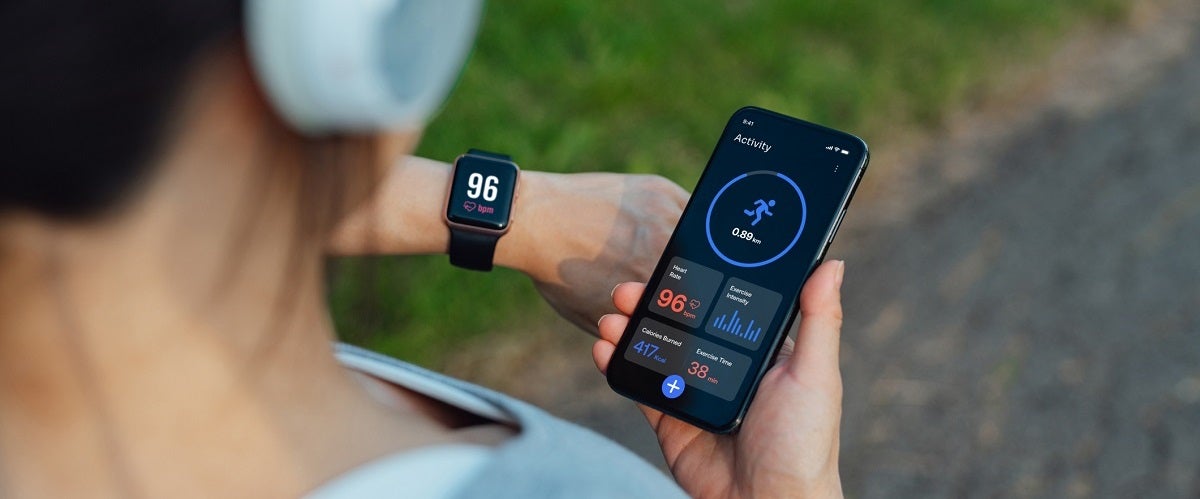Can Wearables Make You Healthier?
April 3, 2024
Categories: Community Health, Health & Wellness, Cardiovascular Health, Men's Health, Women's Health
Wearable technology like fitness trackers, smartwatches and health-tracking rings promise to boost your well-being and get you moving. These devices can measure your heart rate, activity level and sleep quality. Some detect arrhythmias (irregular heartbeats), prompt you to stand at set times or guide you through a meditation exercise.
Are these gadgets worth the investment? Or are they just another fitness fad? It depends on your personality, preferences and health history. These factors can determine whether a wearable is worth your while.
Knowledge Is (Sometimes) Power
Fitness trackers can give you plenty of information about your health. These devices can tell you that you’re not sleeping as much as you thought or only getting 2,000 steps a day. After all, it’s hard to accurately measure these things without the technology wearables offer.
For some people, this data inspires them to prioritize their health. Real-time information can be surprising — and motivating. If you’re already trying to get healthier, a wearable can be the extra nudge you need.
When Wearables Don’t Help
A fitness tracker isn’t right for everyone, however. Perhaps you’ve been walking 30 minutes a day. You feel great and are proud of your effort. But when you check your tracker, you don’t see a change in your cardiovascular health data, which can be frustrating.
Real health change takes time, and a wearable can’t show you all your accomplishments. It also can’t provide data about your mental health, which often improves when you get regular exercise.
If you prefer to see immediate data, try a habit tracker app or sheet. With a habit tracker, you check off positive habits you complete each day, like drinking water or eating veggies instead of chips. The simple act of checking a box helps you see and celebrate your successes.
People with a history of eating disorders or obsessive-compulsive tendencies should also steer clear of wearables. Tracking every step places your focus on statistics, making it easy to slip into compulsive exercising. Instead of following a fitness tracker’s data, stick to the therapies your health care team recommends.
Don’t Forget About Food
If you’re trying to lose weight or improve your cardiovascular health, exercise isn’t the only factor to consider. You might also need to reduce calories or cut back on high-fat, high-sodium foods.
Unfortunately, wearables don’t help with diet changes because they can’t tell how much or what you eat. If you want to improve your diet or count calories, try food journaling. Tracking what you eat can help you evaluate your habits and areas where you want to improve. Use a paper journal or a diet tracking app — whatever you find easier.
Questionable Calorie Counting
Some fitness trackers tell you how many calories you burn during a workout, but this number is an estimate. And some research shows that the count could be way off. If you’re sticking to a specific calorie goal, don’t assume your wearable is 100% correct. Instead, rely on food journaling or ask your provider for nutrition advice.
Your Wearable Doesn’t Replace Your Provider
Even the best fitness tracker on the market cannot replace the care you receive from your health care provider. Only your provider can evaluate your overall health and guide you toward additional tests or treatments when needed.
The data from your wearable can be useful during your appointments, though. Tell your provider if your fitness tracker has detected an irregular heartbeat. Your provider may give you a prescription heart rhythm wearable device that is much more sensitive (and accurate) than a store-bought one. These devices are noninvasive and discreet, providing detailed heart rhythm information over two to four weeks.
A fitness tracker is helpful for some people, but it’s not a health must-have. A skilled provider, on the other hand, is an invaluable partner throughout your health journey. Rely on their guidance and expertise — not a device — to become your healthiest self.
Talk to your provider and find out if a wearable or smart watch is right for you.
If you don't have a provider, find one today!



